
Journal of Structured Finance
Scope & Guideline
Unveiling the Dynamics of Risk and Innovation
Introduction
Aims and Scopes
- Structured Finance Mechanisms:
The journal extensively covers various structured finance products, including collateralized loan obligations (CLOs), asset-backed securities (ABS), and mortgage-backed securities (MBS), providing insights into their structures, performance, and risks. - Market Analysis and Trends:
It features analyses of current trends in financial markets, particularly how economic factors influence structured finance, including interest rates, housing markets, and regulatory environments. - Risk Management and Assessment:
The journal emphasizes methodologies for assessing and managing risks associated with structured financial products, including innovative approaches to credit risk evaluation and market volatility. - Regulatory and Compliance Issues:
Contributions often address the implications of regulatory changes on structured finance markets, exploring how compliance affects market stability and investment strategies. - Sustainability and ESG Integration:
A growing focus on the integration of environmental, social, and governance (ESG) factors into structured finance practices reflects the journal's commitment to addressing contemporary issues in finance.
Trending and Emerging
- Integration of ESG Factors:
There is a notable increase in research addressing how environmental, social, and governance (ESG) considerations are being integrated into structured finance, highlighting the industry's response to growing investor demand for sustainable practices. - Impact of Economic Shifts on Housing and Mortgage Markets:
Papers analyzing the impacts of economic fluctuations, such as rising interest rates and housing market dynamics, suggest a heightened interest in understanding how these factors influence structured finance products. - Technological Advancements in Finance:
Emerging themes include the role of technology in structured finance, particularly concerning data analytics, automated evaluations, and how these innovations are reshaping risk assessment and investment strategies. - Global Market Perspectives:
The journal is increasingly publishing articles with a global perspective, focusing on how international markets and geopolitical factors influence structured finance, reflecting a more interconnected financial landscape.
Declining or Waning
- Traditional Risk Assessment Models:
There appears to be a decline in papers focusing on conventional risk assessment models that do not incorporate newer methodologies or data analytics, as the industry increasingly seeks innovative approaches to risk management. - Historical Analysis of Financial Crises:
Topics centered around historical analyses of past financial crises are less prevalent, suggesting a potential shift towards more forward-looking perspectives that emphasize current market dynamics and future resilience. - Basic Structured Finance Education:
The journal seems to be publishing fewer articles aimed at basic education in structured finance concepts, indicating a possible expectation that readers possess a foundational understanding of these topics.
Similar Journals

European Journal of Finance
Pioneering research that informs financial practice.European Journal of Finance is a prestigious publication specializing in the domains of finance, economics, and econometrics, published by Routledge Journals, Taylor & Francis Ltd. Established in 1995, this journal has become a vital resource for researchers, practitioners, and students, contributing significantly to the understanding of financial systems and markets. With its Q1 ranking in the Economics, Econometrics and Finance category, it stands out for its rigorous peer-reviewed articles that explore innovative theories, models, and empirical studies. The journal's impressive Scopus ranking of 35 out of 242 highlights its impact and relevance within the field, with an 85th percentile standing that underscores its importance to current financial research. Although it does not offer open access, the European Journal of Finance remains a cornerstone for those seeking to delve deeper into the complexities of finance, equipped with insights that drive both academic inquiry and practical application.
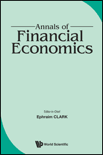
Annals of Financial Economics
Advancing the Frontiers of Financial KnowledgeAnnals of Financial Economics, published by World Scientific Publishing Co. Pte Ltd, is a premier scholarly journal catering to the fields of finance, economics, and international management. With an impressive impact factor and categorized in the Q2 quartile across multiple disciplines in the 2023 rankings, the journal holds a prominent position among its peers, evidenced by its ranking in the top 15% for Economics and Econometrics and Finance categories. The journal aims to foster high-quality, innovative research that addresses contemporary financial issues, making it a vital resource for researchers, professionals, and students alike. Although it does not operate under an open access model, it ensures that its contributions advance scientific discourse and provide valuable insights into financial theories, practices, and policies. With a historical publication span from 2005 to 2009 and again from 2011 to 2024, the Annals remains a critical platform for disseminating transformative ideas in financial economics, ensuring its relevance in a rapidly evolving scholarly landscape.
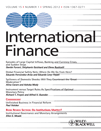
International Finance
Illuminating trends in global financial practices.International Finance is a prestigious academic journal published by WILEY, dedicated to the exploration and advancement of theories and practices in the realms of finance, development, and geography. With a strong emphasis on empirical and theoretical research, this journal provides a crucial platform for researchers, professionals, and students to disseminate cutting-edge findings that shape our understanding of the financial landscape on a global scale. Holding an impressive impact factor and categorized in the Q2 quartile across multiple disciplines, including Development, Finance, and Geography, the journal has established itself as a significant contributor to scholarly discourse. Since its inception in 1998 and spanning until 2024, International Finance offers a comprehensive overview of current trends and challenges faced in financial contexts, enhancing the decision-making processes within academia and industry alike. Although the journal is not open access, its rigorous peer-review process guarantees high-quality content that is indispensable for anyone engaged in the diverse fields intersecting with finance.
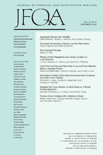
JOURNAL OF FINANCIAL AND QUANTITATIVE ANALYSIS
Exploring the Intersection of Theory and PracticeJOURNAL OF FINANCIAL AND QUANTITATIVE ANALYSIS, published by Cambridge University Press, is a premier peer-reviewed journal that has been at the forefront of the finance and economics fields since its inception in 1966. With a notable impact factor reflecting its Q1 status in Accounting, Economics and Econometrics, and Finance for 2023, the journal is recognized for its substantial contributions to both theoretical and empirical research. Researchers and practitioners alike benefit from its comprehensive scope, addressing critical issues in financial analysis and quantitative methods. Although the journal does not currently offer open access, it remains widely accessible through institutional subscriptions. The editorial team is committed to fostering rigorous academic discussions that shape the future of finance and economics, making it an essential resource for academics, students, and industry professionals seeking to deepen their understanding of these vital disciplines. For more than five decades, this journal has continued to be an indispensable platform for disseminating influential research, thus solidifying its role as an essential cornerstone in the financial and quantitative analysis community.
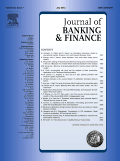
JOURNAL OF BANKING & FINANCE
Navigating the Complexities of Finance with ExpertiseWelcome to the Journal of Banking & Finance, a premier publication in the fields of finance and economics, expertly published by Elsevier. With its esteemed Q1 ranking in both the Economics and Econometrics and Finance categories for 2023, this journal frequently garners significant attention from researchers, professionals, and academics alike. Established in 1977, it has become a crucial resource for the latest research and advancements in banking and financial services, influencing policies and practices on a global scale. The journal's commitment to high-quality, peer-reviewed content ensures that it not only contributes to academic discourse but also drives real-world financial innovation. As part of the respected Elsevier publishing collection, the journal's rigorous standards and comprehensive analysis serve as indispensable tools for those seeking to understand and navigate the complexities of the financial landscape. Located in the Netherlands, the Journal of Banking & Finance continues to play a vital role in shaping the future of financial research through its impactful insights and research contributions.
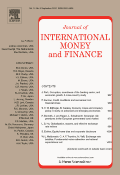
JOURNAL OF INTERNATIONAL MONEY AND FINANCE
Navigating the complexities of international monetary dynamics.JOURNAL OF INTERNATIONAL MONEY AND FINANCE is a premier scholarly publication dedicated to advancing the understanding of international finance and monetary economics. Published by Elsevier Science Ltd, this esteemed journal has been disseminating critical research since its inception in 1982 and will continue to contribute to the field through 2024. With a strong international presence and headquarters in the United Kingdom, the journal boasts an impressive collection of articles that explore significant trends, challenges, and innovations in the areas of economics and finance. Recognized for its impact, it ranks in the top quartile (Q1) in both the Economics and Econometrics and Finance categories as of 2023, signifying its influence and relevance among peers. Researchers, professionals, and students in these disciplines can benefit from the journal's rigorous peer-review process, ensuring high-quality scholarly outputs. Though not currently an open-access journal, it provides various subscription options to foster access to groundbreaking research in the financial ecosystem.

Finance Research Letters
Connecting academia and practice in finance research.Finance Research Letters, published by Academic Press Inc Elsevier Science, is a leading journal in the field of finance, recognized for its exceptional impact as indicated by its Q1 ranking in the Finance category of the Scopus Index, placing it in the top 6% of journals in this area. With an ISSN of 1544-6123 and an E-ISSN of 1544-6131, this journal has been a crucial platform for disseminating cutting-edge research since its inception in 2004. It covers a wide array of topics within finance, including but not limited to portfolio management, risk assessment, and financial innovation, making it an invaluable resource for researchers, professionals, and students committed to advancing their understanding of the financial sector. Although it does not currently offer open access, its contributions to the field are amplified by its impressive Scopus rank of #19 out of 317 in the Economics, Econometrics and Finance category. As the journal continues through its convergence years until 2024, it remains dedicated to publishing high-quality, peer-reviewed articles that reflect the latest trends and innovations in financial research.
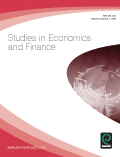
Studies in Economics and Finance
Exploring the forefront of economic thought.Studies in Economics and Finance is a distinguished journal published by Emerald Group Publishing Ltd, based in the United Kingdom. With an ISSN of 1086-7376 and an E-ISSN of 1755-6791, this journal has been a significant contributor to the fields of economics, econometrics, and finance since its inception, with coverage ranging from 1977 to the present. Ranked in the second quartile (Q2) for 2023 in its relevant categories, it holds a reputable position within the 83rd percentile in the general economics, econometrics, and finance fields according to Scopus rankings. This journal aims to disseminate cutting-edge research that addresses key issues and emerging trends in the economic and financial landscapes, fostering dialogue among scholars, practitioners, and policymakers. Although it does not operate under an Open Access model, Studies in Economics and Finance continues to be an essential resource for advancing knowledge and providing insights that are crucial for understanding complex economic behaviors and financial systems.
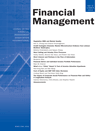
FINANCIAL MANAGEMENT
Connecting Theory and Practice in Financial ManagementFINANCIAL MANAGEMENT is a premier academic journal published by Wiley, focusing on the intricate domains of Accounting, Economics, and Finance. With an ISSN of 0046-3892 and an E-ISSN of 1755-053X, this esteemed journal has made significant contributions to the global discourse on financial practices and theories since its establishment in 1996. Situated within the top tier (Q1) in its respective fields, FINANCIAL MANAGEMENT ranks impressively in Scopus, positioned at 30 out of 176 in Accounting and 57 out of 317 in Finance, reflecting its high impact and relevance in the scholarly community. The journal is known for its rigorous peer-review process and publishes cutting-edge research aimed at advancing knowledge and practice in financial management. Although it does not offer Open Access, it remains accessible through institutional subscriptions, ensuring that researchers, professionals, and students remain at the forefront of developments in financial management. With a commitment to excellence, FINANCIAL MANAGEMENT continues to be an indispensable resource for those seeking to deepen their understanding of this critical field.
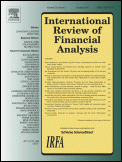
International Review of Financial Analysis
Advancing financial knowledge through rigorous analysis.The International Review of Financial Analysis, published by Elsevier Science Inc, is a premier journal dedicated to advancing the fields of finance and economics. With an impressive impact factor and ranked in the top quartile (Q1) of both Economics and Econometrics and Finance categories, this journal is recognized for its high-quality research and significant contributions to the discipline. Since its inception in 1992, it has provided a platform for scholars to present innovative theories and empirical studies that address critical financial issues around the globe, making it a vital resource for researchers, professionals, and students alike. Although it does not offer open access, the journal actively engages with contemporary debates in financial analysis, ultimately empowering its readership to contribute to and benefit from the ongoing discourse. With its convergence of financial research and analytical methodologies through 2024, the International Review of Financial Analysis remains a cornerstone in the pursuit of knowledge within the ever-evolving landscape of finance.